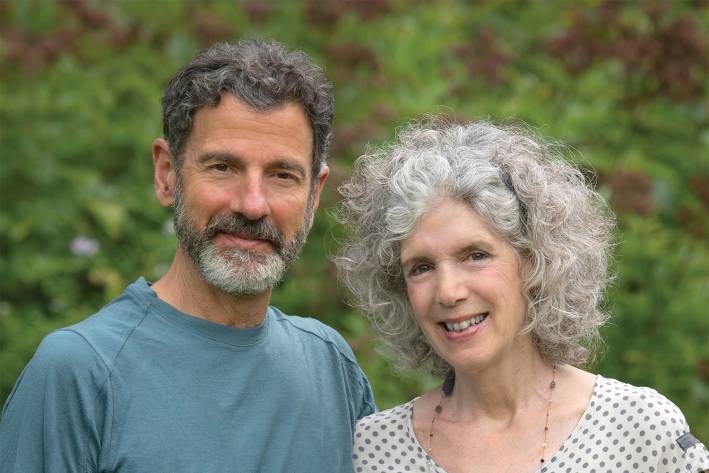After almost 40 years of exploring the power of herbs, natural health pioneers Paul and Barbi Schulick are taking their most important lessons and creating a company they hope will contribute to the health of the global community. “There’s a certain calling one gets in one’s life. If you’re lucky enough, you get to hear that calling and follow it,” said Paul. For the Schulicks, it’s always been meditation and working with herbs.
Bright Beginnings
The two were meditation teachers when they met in 1975. The late 1970s brought ownership of a natural foods store, followed by Paul’s becoming a master herbalist. He still remembers the day shortly after the store opened when a woman with breast cancer came in. She had nowhere to turn for the type of information she was seeking. At that time, there was only one doctor in New England with familiarity with the science of nutrition and supplementation, Paul said. “I was humbled and scared by the responsibility.”
The Schulicks began creating their own herbal formulations, and in 1982, launched the New Chapter supplements company, which pioneered whole-food fermentation and supercritical extraction.
The Schulicks sold New Chapter to Procter & Gamble in 2012, but maintained roles with the company until the summer of 2018, when they did not renew their contracts. Instead, the Brattleboro, VT, couple returned to their entrepreneurial roots, launching a skin-health company called byOM life. The new company aims to use nutrition and herbs to support the skin’s microbiome. The company name refers both to the “biome” and the word “om,” which has played a significant role in the Schulicks’ decades of meditation practice.
The New Science of Bacteria
The human digestive system has been called the body’s “second brain” and some scientists now believe the skin—the body’s largest organ—may be the “third brain.” The epidermis contains sensors and neurotransmitters that can communicate with our central nervous system and influence emotions and whole-body states.
byOM life is a way to be involved in this growing field of research and a new approach to overall skin health, Paul said. Say a person is struggling with an eczema breakout. She might not need another application of antibacterial cream. What she may need is biodiversity of bacteria on the skin, just like it’s needed in the gut, he said.
At press time, scientists the Schulicks have worked with for years were testing the topical formulations, the first of which are scheduled to be released in the spring. Nutraceuticals will be introduced in the summer of 2020.
The Past and Future of the Natural Health Field
Looking back to the early years, Paul sees tremendous change in the natural health field. At the early trade shows, all the exhibitor booths could fit into one relatively small room. Today, there are “auditoriums upon auditoriums upon auditoriums of booth spaces,” he said. “Business, and sometimes greed, has entered into the marketplace. In the beginning, there was much more of an emphasis on healing.”
While awareness has grown over time, “there is still need for a paradigm shift” when it comes to health, Paul said. He points to processed food as just one example. “Right there, there’s the root of lots of our disease,” he said. Eating that type of food is “energetically... dipping yourself in preservatives and chaos.”
The Health-Care Crisis
Paul believes that in addition to climate change, one of the biggest crises facing humankind is the crisis in the healthcare system. The United States lags behind many other countries in terms of health despite the trillions of dollars being spent on healthcare.
“We’re not getting our money’s worth,” he said. “Financial incentives have to switch from disease care to true health care,” he said. “We can learn a lot of lessons from Japan.”
Health and Wellness in Japan
In Japan, a doctor—who’s typically trained in herbal medicine as well as Western medicine—won’t prescribe painkillers to someone who’s neglected their t’ai chi exercises or acupuncture treatments, Paul said. Only when they’ve done all they can will a doctor prescribe painkillers, he added.
When Paul visited Japan, he noticed a marked silence and a population that was visibly much healthier than Americans. He adopted the Japanese ritual of forest bathing, which requires time in nature, completely unplugged. “I live in a forest and I take a forest bath two to three times a day,” Paul said. Studies have shown the practice can induce relaxation and increase anti-cancer activity in the body.
What's Next for Paul and Barbi?
His new company often keeps him up until 1 a.m., reading, studying, and writing a book about his philosophies. “It never feels like work. It’s always just my life,” he said. “These days I’m working harder than ever and am amazed at how tired I feel.” But when he remembers the “global biomes we are going to be supporting,” he feels almost immediately restored, well, and rejuvenated.
“From my little vantage point, the herbal kingdom is one of our greatest allies,” he said. If properly sourced and extracted, herbs can support human health and biomes. “They give me solace. There’s still hope in this dangerous time we’re living in as a species.”


